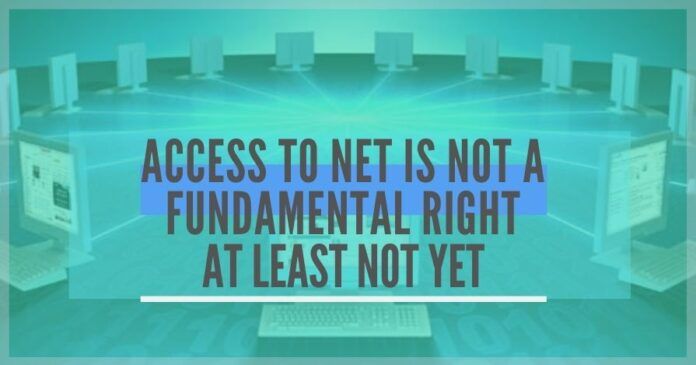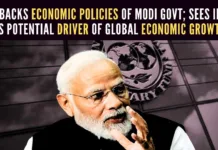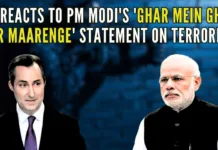
The three-judge Bench on Internet matter in Jammu & Kashmir added that the “importance of Internet cannot be underestimated, as from morning to night we are encapsulated within cyberspace and our basic activities are enabled by the use of the Internet”.
Opposition parties and anti-Modi activists are exulting over a recent Supreme Court order questioning the Centre’s decision to suspend Internet services in Jammu & Kashmir following the virtual abrogation of Article 370 of the Constitution of India. Critics of the government have celebrated what they see as the court’s censuring of the Modi regime, and have hailed the court for having mandated that access to Internet services is a fundamental right available to the people under the Constitution. They are wrong on both counts.
It must be understood that if the Internet is a medium for freedom of expression under Article 19, then it also attracts reasonable restrictions that are mandated in that very same Article.
First, there is not a single instance in the order that questioned the government’s right to suspend Net services. There is no adverbial remark, barring a caution that indefinite suspension of the services is not “permissible”. Here too, the three-judge Bench said that when such a situation arises, the government should make available in the public domain material that justifies the suspension so that the common man can understand and, if he wants, challenge the decision.
It must also be made clear that the apex court did not hold access to the Internet as a fundamental right. It did not even examine this issue. Instead, it held the Net as a tool for freedom of speech and expression. It maintained that “freedom of speech and expression through the medium of the Internet is an integral part of Article 19(1)(a)”. It must be understood that if the Internet is a medium for freedom of expression under Article 19, then it also attracts reasonable restrictions that are mandated in that very same Article. Therefore, the court also underlined the accountability of those who use the Net to express free speech.
That apart, it is possible that someday, the apex court may well unambiguously pronounce someday that access to the Internet is a fundamental right. Over the years, it has enlarged the corpus of fundamental rights. Take Article 21, for instance. It says that “no person shall be deprived of his life or personal dignity except according to the procedure established by law”. The ‘life’ here got expanded by a court order to “life with dignity”. Thus, the right to free movement (Maneka Gandhi versus Union of India) also became a ‘life with dignity’. The court, a full sweep, also held that “all that goes with human dignity” becomes a fundamental right.
And so, we have the right to shelter, the right to protection of one’s heritage (because it gives meaning to a man’s life), the right to health, the right to suitable accommodation, etc, all getting absorbed into the established fundamental rights. The right to privacy is not mentioned anywhere in the Constitution, but that has been held by the court as integral to the right to life and liberty. In August 2017, a nine-judge Constitution Bench of the Supreme Court ruled that the right to privacy was “intrinsic to life and liberty”. This has led many to wonder whether this order will have a bearing on pleas that have been filed against the Aadhaar scheme by certain people who have argued, among other things, that it encroaches upon an individuals’ right to privacy. Then there is the right to clean environment, the right to an egalitarian social order, etc — all of which have come to be understood as intrinsic to right to life and liberty. For example, in a 1995 verdict involving Consumer Education and Research Centre versus Union of India, the apex court had said that “the right to human dignity, development of personality social protection, right to rest and leisure are fundamental human rights of a workman assured by the Charter of Human Rights, in the Preamble and Articles 38 and 39 of the Constitution”.
In 1997, the court ruled: “It is now settled that right to health is integral to the right to life.” In sum, one aspect after the other has got added to the basic terminology of right to life and liberty over the decades.
Two years after that ruling, the Supreme Court, hearing another matter of an individual doctor versus Union of India, said that “right to life enshrined in Article 21 means right to have something more than survival and not mere existence animal existence”. The extension of the right to life and liberty went to further extents when the court, in yet another case, ruled it had to take up the issue of health hazards due to smoke from diesel engines because chronic exposure to pollutant fumes violated the right to life. Also in 1997, the court ruled: “It is now settled that right to health is integral to the right to life.” In sum, one aspect after the other has got added to the basic terminology of right to life and liberty over the decades.
Returning to the Internet matter involving Jammu & Kashmir, the apex court came close to declaring access to the Net as a fundamental right. It said that “freedom of speech and freedom to practice any profession or do business online is as constitutionally guaranteed fundamental right”. The three-judge Bench also added that the “importance of the Internet cannot be underestimated, as from morning to night we are encapsulated within cyberspace and our basic activities are enabled by the use of the Internet”. The court declared that the freedom of speech and expression and the freedom to conduct any practice or occupation through the Net “enjoys constitutional protection under Article 19(1)(a) and Article 19(1)(g)”, and that restriction on such fundamental rights “should be in consonance with the mandate under Article 19(2) and (6) of the Constitution”. For the record, the ruling came on petitions filed by senior Congress leader Ghulam Nabi Azad and the publisher of Kashmir Times.
Note:
1. The views expressed here are those of the author and do not necessarily represent or reflect the views of PGurus.











Current trends require professional but free hand to contain inimical interests to public order and also require that judiciary should educate themselves on the spirit of constitution rather than playing by the gallery. Just as it is said that Justice Delayed is Justice Denied, it is equally or even more true that Punishments Delayed is Crime Abetted. Let not the Indian court cases have indefinite lifetime awarded by systemic flaws like that of the lifetime of select students in JNU.
Khangress has their sponsored judges in every state court to support every anti-India activities. Tomorrow if Pappu says something, these sponsored judges will rush or compete to say it legal to talk any nonsense & protected by constitution i.e. Pappu – the name is protected by Constitution of India, so does Bar Maid & her dump headed fashion daughter
Today’s definition of Indian democracy as interpreted by the adopted,British legal system.
Burning public property—- freedom of expression
Abusing nation and armed forces—- freedom of expression.
Spreading fake news by MSM to destroy police/ intellectuals—-freedom of expression.
Imposing section 144– violation of freedom of expression.
Restriction on internet to curb fake news —- violation of fundamental rights.
Action on rioters by police——police brutality.
We have reached a stage where open prostitution, is encouraged under the garb of Live in relation ship. Communists and Muslims speak of democracy while none exist in communist or Islamic countries.Then why do you require police ? They should be disbanded as their presence is causing mental torture to me, violating my freedom to practice freehold life which is fundamental right under section 19 of our noble constitution.
Very well said.. judges and liberaltards sitring in ivory towers blabber anything and play to the gallery! An ordinary citizen wants to live in peace, with no disturbance agitation riot or strike etc.. Police have to take on the spot decision .. unlike judiciary who sleep over imp cases for years and pass orders that are appealed many times over..
TODAY ILLEGAL COLLEGIUM JUDGES ARE IN CONTEMPT OF THE CONSTITUTION AS WELL AS “WE THE PEOPLE”. .
THE WATAN AND DHARMA ( NATURAL JUSTICE ) LIES ABOVE THE CONSTITUTION AND “WE THE PEOPLE”..
JUDGES DO NOT HAVE THE POWERS OF JUDICIAL REVIEW OF LAWS CREATED BY LAW MAKERS…ie. PARLIAMENT – (EXAMPLE SEC 370).
THERE IS NO PROVISION FOR “JUDICIAL REVIEW “ IN THE CONSTITUTION.. THESE WORDS JUST DON’T EXIST ..
THE SUPREME COURT IS ITSELF BOUND BY THE CONSTITUTION OF INDIA AND THE PARLIAMENT CAN AMEND THE CONSTITUTION ANY TIME THEY WANT.. CONSTITUTION CANNOT BE ALLOWED TO STRAITJACKET THE PEOPLE/ WATAN/ DHARMA.
WE ASK PM MODI TO JAIL SOME DESH DROHI DEEP STATE CONTROLLED COLLEGIUM JUDGES USING MILITARY COURTS ..AS AN EXEMPLARY MEASURE..